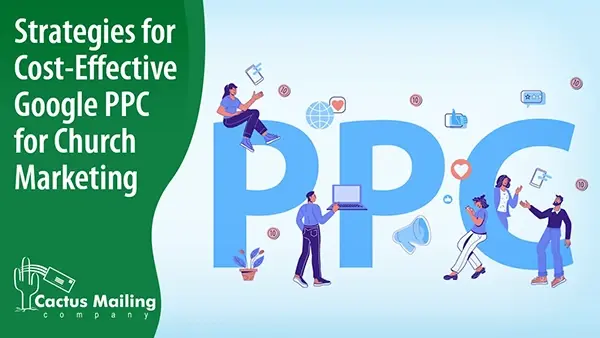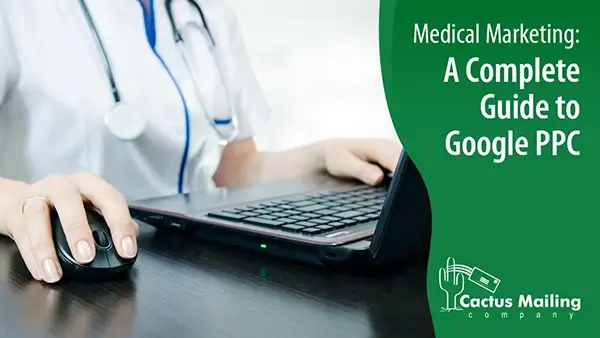We Are Here to Help!
What to Expect from Us:
No Pressure, Just Service!
Get no obligation pricing details and strategies that will work for your business.
Online presence is crucial for churches to reach and engage with their communities. Your church website and social media account may attract more visitors and followers through Google Pay-Per-Click (Google PPC) advertising. It's essential to approach click advertising strategically to maximize impact while keeping costs in check. Let's explore effective strategies for running cost-effective Google PPC advertising tailored specifically for church marketing.
What is Google PPC?
Google PPC is an online advertising model where advertisers pay a fee each time their ad is clicked. For a local church, Google PPC allows the church to create and display ads on Google's search engine results pages (SERPs) or other websites within the Google Display Network. This form of advertising enables churches to target specific keywords, demographics, and geographic locations, making it a powerful tool for reaching the local community and promoting church activities.
For a local church, Google PPC can be used to:
- Increase Visibility: By bidding on relevant keywords, a church can ensure its ads appear when people in the community search for topics related to faith, community events, or services.
- Promote Events: PPC campaigns effectively promote special events, services, or community outreach programs. Ads can be tailored to specific dates and locations, maximizing the impact of promotional efforts.
- Connect with the Community: PPC marketing allows churches to connect with individuals who may not be aware of their presence. This outreach is especially valuable for welcoming new members and fostering community engagement.
- Drive Website Traffic: Churches can direct users to their websites through PPC ads, encouraging further exploration of online resources, event calendars, and community initiatives.
- Target Specific Demographics: PPC platforms allow churches to customize their targeting parameters, ensuring ads are shown to specific age groups, interests, or other demographics relevant to the church's mission.
Google Grant for Nonprofits
The Google Ad Grant program is designed and available for eligible nonprofits, including local churches. It allows churches to receive up to $10,000 in free monthly advertising, providing additional resources to enhance online visibility.

Consider applying for a Google Ad Grant if your church is a registered non-profit. This program provides eligible organizations with a free advertising budget, allowing you to promote your church without directly impacting your finances. The goal is to help organizations effectively advance their missions, initiatives, and community services. Google Ad Grants can be beneficial for several reasons:
- Free Advertising Budget: Ad Grants offer a significant monthly budget that can be used to run Google Ads (rebranded Google Adwords) campaigns at no cost to the church. It is a valuable resource for churches operating on limited budgets.
- Increased Visibility: With access to Google Ads, churches can increase their online visibility and reach a broader audience. It is especially useful for promoting community events, services, and charitable activities.
- Community Engagement: Ad Grants allow churches to engage with the local community online, driving traffic to their website and encouraging participation in events or services.
- Promotion of Social Causes: Churches often engage in social outreach and community service. Ad Grants provide an opportunity to raise awareness for these causes and attract volunteers or support from the local community.
- Educational Initiatives: Churches can use Ad Grants to promote educational content, online resources, or initiatives that align with their mission, fostering community and connection.
Digital Advertising: How to Start Your Church's PPC Campaign
Identify Click Advertising Goals
Outline the specific goals of your church's PPC campaign. Clearly defined objectives will guide your campaign structure and content. Some examples of ad campaign goals are:
- Increase church attendance
- Promote community engagement
- Boost online giving
- Encourage event participation or volunteerism
- Drive website traffic
- Facilitate online learning
- Promote special services (weddings and baptisms)
- Encourage youth and family participation
- Enhance the reach of social media accounts
- Increase newsletter subscriptions
Keyword Research with a Ministry Focus
Keyword research is a critical aspect of any paid ad. Utilizing keywords relevant to the church's mission and activities aids in search engine optimization. Focusing on terms related to church, faith, or church activities is an important local SEO strategy to boost your ministry ad's visibility in search results. Using keywords with the local context improves your content relevance. It increases the likelihood of reaching individuals in your geographic area.

Those seeking spiritual or community involvement can find out about your church when you incorporate keywords that your target audience will likely input on a Google search.
You don't have to spend on keyword research. Do you want to know how to start at no cost? Look at Epic Life Creative's list of The Top 20 Most Effective Keywords for Church and Ministry SEO Success for keywords on your first local SEO campaign.
If you'd rather hire a professional, Our Church.com offers church SEO services, among others.
Geo-Targeting for Local Impact
Use geo-targeting to focus your ads on specific geographic areas surrounding your church. It helps you manage your costs strategically by reaching people within your community who are more likely to engage with your church.
To maximize local impact, you can use direct mail with addressable geofencing utilizing precise geographical areas for the church's surroundings. Creating content tailored to local interests, understanding local demographics, and employing localized advertising on platforms such as Google Ads and Facebook Ad is also crucial.
Leveraging location-based features on social media, promoting local church events, and encouraging local reviews on your Google business profile also contribute to a comprehensive approach.
Optimize Your Search Ad Copy
Your ad copy should speak directly to the needs and interests of your target audience to enhance the effectiveness and engagement of your search engine marketing. Highlight unique aspects of your church, upcoming events, or community involvement to capture attention and encourage clicks. Use language that creates a strong emotional connection to your ad copy and includes a clear call to action to direct potential attendees.
Optimizing ad copy strengthens your church's digital presence, differentiates you from other churches, attracts a more engaged audience, and encourages meaningful interactions.
Utilize Ad Extensions
Ad extensions are additional information that can be added to text ads in Google Ads to provide more context and encourage user engagement. These extensions expand the ad with extra details, often including links to relevant pages on your church website, contact details, location, or additional text ads. For churches utilizing Google PPC advertising, various ad extensions can be beneficial.
- Website Link Extensions: Links to specific pages such as "About Us" or "Upcoming Events" pages.
- Callout Extensions: Highlighting key features or offerings, such as community events, volunteer opportunities, or special programs.
- Location Extensions: Display the church's address, making it easier for users to find and attend services.
- Call Extensions: Including a phone number for interested individuals to contact the church easily.
- Structured Snippet Extensions: Showcase specific aspects of the church or provide additional context to potential attendees.

Churches can enhance the visibility and relevance of their Google PPC marketing to make them more informative and compelling to users by incorporating ad extensions. It enhances the user experience and improves ad visibility and click-through rates.
Church marketing services like Reliant Creative and Golden Realm can help you craft effective campaigns with ad extensions.
Implement Conversion Tracking
A church can gain valuable insights into users' actions after interacting with their Google Ads when you set up conversion tracking. The data enables informed decision-making, allowing the church to allocate budget effectively, refine ad content, and focus on strategies that drive meaningful outcomes.
Here's a step-by-step guide:
Set Up a Conversion Action:
- Log in to your Google Ads account.
- Go to "Tools & Settings" and select "Conversions."
- Click on the "+" button to create a new conversion action.
- Choose the type of conversion that aligns with your church's goals, such as website visits, form submissions, or calls.
Define Conversion Settings:
- Provide details such as the conversion name, value, and counting method.
- Decide whether to include the conversion in your "Conversions" column for optimization.
Install the Conversion Tracking Code:
- After setting up the conversion action, you'll receive a tracking code snippet.
- Copy and paste this code onto the relevant pages of your website, such as the confirmation page after a form submission or a thank-you page after a donation.
Test the Tracking Code:
- Verify that the tracking code works correctly by completing a test conversion and checking if it registers in your Google Ads account.
Adjust Conversion Settings (Optional):
- Customize the conversion window and attribution model based on your church's preferences and goals.
Monitor and Analyze Results:
- Regularly review the conversion data in your Google Ads account to assess the performance of your ads.
- Use the insights gained to optimize your campaigns for better results.
Budget Management and Bid Optimization
Effective budget management and bid optimization are necessary to maximize the impact of your church's Google PPC ad, especially when leveraging the Google Ad Grant program. With a limited budget, allocating your ad spend strategically across digital marketing campaigns that align with the church's goals is essential.

Bid optimization involves adjusting the bid amounts for keywords to ensure the best placement while staying within budget constraints. By carefully managing budgets, tracking changes in spending patterns, optimizing bids, and leveraging the Google Grant and Google Search Network, churches can achieve missional marketing objectives by effectively communicating their goals and values to a wider online audience.
Promote Engaging Content
Posting engaging and informative content helps drive website traffic. It is paramount for the success of Google PPC campaigns, particularly when utilizing the expansive reach of the Google Display Network (GDN). GDN ads are displayed as banners, images, videos, or text on websites that are part of the Google Display Network and can be displayed on a network of Google partner websites and on Google-owned properties such as YouTube, Gmail, and various other websites across the internet.
Your church website can potentially promote a variety of engaging content that resonates with existing members and individuals exploring the community. When considering content for Google PPC ads, a church can effectively promote:
- Church Event Announcements: Showcase upcoming events, special services, or community gatherings to generate excitement and encourage attendance.
- Online Giving and Support: Highlight the ease and security of online giving. Emphasize the convenience for members to contribute financially to the church's programs and initiatives.
- Online Resources: Direct users to educational content such as online Bible studies, articles, or video resources, catering to those seeking spiritual growth and knowledge.
- Social Media Marketing: Encourage engagement and followership by creating ads that promote the church's social media accounts.
- Volunteer Opportunities: Raise awareness about volunteer opportunities and provide a clear call-to-action for participation.
By focusing PPC ads on these specific content types, a church can effectively reach its target audience, drive meaningful engagement, and achieve its communication and community-building goals.
Google Analytics: Regularly Evaluate and Adapt
Google Analytics provides valuable insights into user behavior on your church website, offering data on page views, session durations, and user demographics. By integrating Google Analytics with your missional marketing PPC strategy, you can track user interactions, identify high-performing keywords, and measure the success of a paid ad. This data empowers your church to make data-driven decisions, refine your content strategy, and allocate ad spend more effectively. Google Analytics also helps churches understand the impact of their PPC efforts on website traffic, allowing for continuous improvement and optimization of online engagement strategies.

Conclusion
A thoughtfully developed Google PPC strategy is important for church marketing. Any church can strategically expand its online reach and engage with its communities effectively by cost-effectively leveraging Google Ads. Churches can strategically advertise church initiatives and events with their target audience as the Google Ad Grant program empowers churches with a substantial monthly budget to amplify their online presence at no direct cost. By embracing the digital marketing strategies mentioned, churches can foster community connections, promote their mission, and make a meaningful impact through the digital landscape with minimal costs.
Our postcards have helped various churches get leads, boost awareness, and grow revenue. Let us help you create a marketing postcard design to achieve your marketing goals!

 Cactus Mail Team: Apr 15, 2024
Cactus Mail Team: Apr 15, 2024



